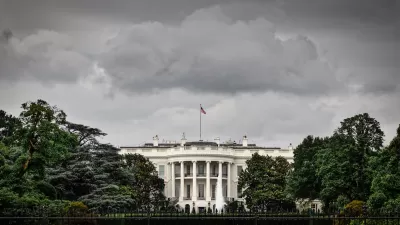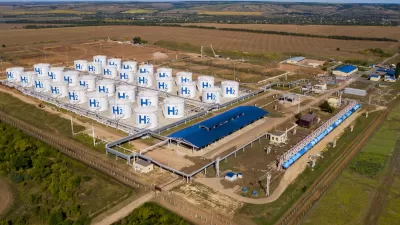Michael Lind argues that the version of the nation's infrastructure priorities we've been sold is a fallacy, and he has some suggestions for the kind of infrastructure we really need.
Lind's opines that the consensus about the need to focus infrastructure investment on mass transit and renewable energy that has been adopted by the Obama administration and the political left are misguided. He sees the shale gas and robocar revolutions as delivering the fatal blows to those visions of the "next American infrastructure."
In their place he suggests a new, and decidedly less captivating, course for infrastructure inverstment. "If windmills and bullet trains symbolize yesterday's mistaken vision of
the future, what kind of infrastructure will twenty-first century
America really need? The following list of possibilities is intended to
be suggestive, not definitive:"
- Pipeline networks
- Ports
- Truck-only lanes and congestion relief tunnels
- Drones on the home front
"As the ill-fated vision of bullet trains and windmills shows, all
visions of the future are tentative and must be constantly revised, in
the light of new breakthroughs or political and economic realities.
Even so, at least some of these infrastructure technologies are likely
to play an important part in the economy of tomorrow."
Thanks to Daniel Lippman
FULL STORY: Oops — wrong future!

Alabama: Trump Terminates Settlements for Black Communities Harmed By Raw Sewage
Trump deemed the landmark civil rights agreement “illegal DEI and environmental justice policy.”

Planetizen Federal Action Tracker
A weekly monitor of how Trump’s orders and actions are impacting planners and planning in America.

The 120 Year Old Tiny Home Villages That Sheltered San Francisco’s Earthquake Refugees
More than a century ago, San Francisco mobilized to house thousands of residents displaced by the 1906 earthquake. Could their strategy offer a model for the present?

In Both Crashes and Crime, Public Transportation is Far Safer than Driving
Contrary to popular assumptions, public transportation has far lower crash and crime rates than automobile travel. For safer communities, improve and encourage transit travel.

Report: Zoning Reforms Should Complement Nashville’s Ambitious Transit Plan
Without reform, restrictive zoning codes will limit the impact of the city’s planned transit expansion and could exclude some of the residents who depend on transit the most.

Judge Orders Release of Frozen IRA, IIJA Funding
The decision is a victory for environmental groups who charged that freezing funds for critical infrastructure and disaster response programs caused “real and irreparable harm” to communities.
Urban Design for Planners 1: Software Tools
This six-course series explores essential urban design concepts using open source software and equips planners with the tools they need to participate fully in the urban design process.
Planning for Universal Design
Learn the tools for implementing Universal Design in planning regulations.
Clanton & Associates, Inc.
Jessamine County Fiscal Court
Institute for Housing and Urban Development Studies (IHS)
City of Grandview
Harvard GSD Executive Education
Toledo-Lucas County Plan Commissions
Salt Lake City
NYU Wagner Graduate School of Public Service




























